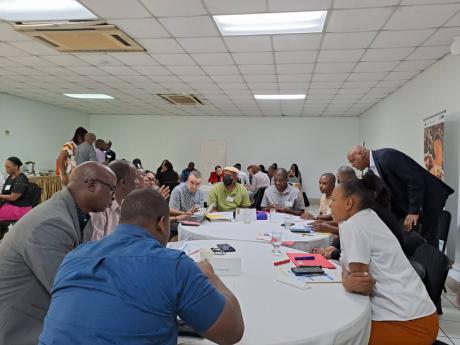Research agenda developed under USDA’s Food for Progress spices initiative
Under its Food for Progress Jamaica Spices initiative, the United States Department of Agriculture (USDA) recently hosted its first research visioning session at the Medallion Hall Hotel in St Andrew as part of its ongoing efforts to revitalise Jamaica’s spice industry.
The project was officially launched in 2023 and is scheduled to conclude in 2027. It intends to assist Jamaica in satisfying its present demands for pimento, ginger, and turmeric, both locally and internationally.
The research seminar, which was held last month, brought together 42 researchers and valuable stakeholders, such as members from The University of the West Indies, the Scientific Research Council (SRC), the plant quarantine of the Ministry of Agriculture, Fisheries and Mining, the Rural Agricultural Development Authority (RADA), and Jamaica Agricultural Commodities Resources Authority (JACRA), to discuss and develop a research agenda that will help to reduce duplication and maximise resource efficiencies.
After three automated prioritisation activities, all the information needed to prepare the priority research agenda was collected.
It was developed in accordance with feedback from stakeholders and will concentrate on applying knowledge of the three spices’ local profiles, protecting their genetic stock, improving the access and systems for producing clean and improved spice planting materials to make them more affordable for farmers, and to develop agroforestry production systems.
It will also address managing the ginger rhizome rot through an integrated approach, offering additional support to the SRC in identifying a resistant/tolerant line to ginger rhizome rot, and improving nutrition programme for the spice crop towards improving production and productivity of these crops.
“Research on spices [is] currently being conducted on various aspects of ginger, turmeric, and pimento along the value chain in Jamaica, the Caribbean region, and internationally. The need exists to catalogue all the work being done and conducted by whom, extract useful findings and adapt them to guide the project activities, as well as design approaches to research for the spice sector,” a project representative said.
The seminar also aimed to identify gaps in the research on spices, examine the inventory of current and proposed work, and offer a summary of a compiled compendium of research work done on the relevant spices.
Additionally, it aimed to establish a community of practice known as the spices research network.
Under the Food for Progress Jamaica Spices initiative, it is projected that yields of turmeric, ginger, and pimento will be increased through improved planting material and management practices on 2,250 hectares of land by 50 per cent, resulting in $20.7 million in sales, $14.5 million in annual export sales and for a more diversified, inclusive, sustainable, and climate-resilient spice sector.
The project will support more than 7,500 agricultural market system actors, including women, youth, and other marginalised groups.
“All project activities incorporate market systems strengthening strategies, reinforce climate-resilient and nature-positive production practices to increase the productivity, trade, and environmental resilience of spice crops, promote gender equity, social inclusion, and youth engagement in agriculture. This will be achieved through training and capacity building, supporting inclusive business cultures and models, increasing access to finance and emphasizing mobile and information technologies,” a project representative said.


